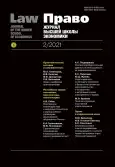Electronic Interaction and Digital Technologies in Corporate Governance of a Joint Stock Company in Russia
- Authors: Gabov A.1
-
Affiliations:
- Institute of State and Law of the Russian Academy of Sciences
- Issue: Vol 14, No 2 (2021)
- Pages: 24-64
- Section: Russian Law: Condition, Perspectives, Commentaries
- URL: https://journal-vniispk.ru/2072-8166/article/view/318104
- DOI: https://doi.org/10.17323/2072-8166.2021.2.24.64
- ID: 318104
Cite item
Full Text
Abstract
About the authors
Alexander Gabov
Institute of State and Law of the Russian Academy of Sciences
Email: gabov@igpran.ru
Corresponding Member of the Russian Academy of Sciences, Chief Researcher
References
- Alekseev R.A., Abramov A.V. (2020) Electronic voting and electoral blockchain technology in Russia and abroad. Grazhdanin. Vybory. Vlast', no 1, pp. 9-21 (in Russian)
- Antonov Ya.V. (2015) Legal regulation of electronic voting in Russia. Upravlencheskoe konsul'tirovanie, no 5, pp. 63-71 (in Russian)
- Bataeva B.S. (2020) Development of corporate governance using electronic voting services. Upravlencheskie nauki, no 2, pp. 74-87 (in Russian)
- Chekhovskaya S.A. (2016) Modern development of corporate legislation. Pravo. Zhurnal Vysshey shkoly ekonomiki, no 2, pp. 74-86 (in Russian)
- Chekhovskaya S.A. (2018) New contours of corporate law. Predprinimatelskoe pravo, no 3, pp. 31-41 (in Russian)
- Druzhinin A. (2012) What is the best way to use electronic means of communication during GMS? Aktsionerniy vestnik, no 9, pp. 38-44 (in Russian)
- Elnikova E.V. (2020) The use of digital technologies in voting at the general meeting of shareholders of a business company. Vestnik Universiteta O.E. Kutafina, no 7, pp. 60-67 (in Russian)
- Fedorov V.I. (2017) Electronic voting: idee fixe or the foundation of future democracies? Grazhdanin. Vybory. Vlast, no 1-2, pp. 170-185 (in Russian)
- Fedorov V.I. (2020) Projects for the automation of voting in a historical retrospective. Grazhdanin. Vybory. Vlast, no 1, pp. 34-55 (in Russian)
- Gontar S.G. (2019) Electronic voting — a new opportunity for citizens to participate in the formation of government bodies. Gosudarstvennaya vlast' i mestnoe samoupravlenie, no 4, pp. 29-33 (in Russian)
- Grigoriev A.V. (2020) Constitutional regulation of modern information and communication technologies in the implementation of direct democracy in Russia. Candidate of Juridical Sciences Summary. Moscow, 30 p. (in Russian)
- Kersting N. (2007) Electronic voting and democracy in Europe. Politicheskaya nauka, no 4, pp. 123-144 (in Russian)
- Khamutovskaya S. (2019) New voting technologies: foreign experience. Nauka i innovatsii, no 4, pp. 39-42 (in Russian)
- Kolyushin E.I. (2020) Legal issues of remote electronic voting of voters. Konstitutsionnoe i munitsipal'noe pravo, no 2, pp. 25-30 (in Russian)
- Kraakman R., Apmour J., Davies P. et al (2017) The Anatomy of Corporate Law. Oxford: University Press, 281 p.
- Lanskov D.P., Danilova S.A. (2019) Complex of electronic relations between registrars, issuers and shareholders. Aktsionernoe obschestvo: voprosy korportativnogo upravleniya, no 2, pp. 25-30 (in Russian)
- Magdalinskaya Yu.V. (2020) Legal regulation of electronic voting of shareholders (e-voting). Informatsionnoe pravo, no 1, pp. 44-48 (in Russian)
- Matrenina K.Yu. (2017) Formation of electronic voting in elections in the Russian Federation and the prospects for its development. Candidate of Juridical Sciences Thesis. Tyumen, 224 p. (in Russian)
- Medvedeva T.M., Azimova L.V. (2020) Electronic technologies in corporate relations. Khozyaystvo i pravo, no 9, pp. 65-79 (in Russian)
- Murashov M.V., Papin E.N., Voziyan V. Yu. (2020) Electronic voting — a new level. Available at: URL:https://ao-journal.ru/(accessed: 7.02. 2021) (in Russian)
- Novoselova L., Medvedeva T. (2017) Blockchain for voting by shareholders. Khozyaystvo i pravo, no 10, pp. 10-21 (in Russian)
- Pavlushkin A.V., Postnikov A.E. (2009) Legal Mechanism of Remote Electronic Voting (Analysis of a Possible Model). Zhurnal rossiyskogo prava, no 11, pp. 5-13 (in Russian)
- Saccone F. (2010) E-Proxy Reform, Activism, and the Decline in Retail Shareholder Voting. Conference Board Director Notes DN-021. Available at SSRN:https://ssrn.com/abstract=1731362(accessed: 1.03. 2021)
- Sychev P.G. (2011) New legislative initiatives: protection of the corporate governance system or a gift to raiders? Bezopasnost biznesa, no 1, pp. 30-34 (in Russian)
- Tsaplin A.Yu. (2016) Prospects for remote electronic voting in Russia. Izvestia Saratovskogo University. Politologiya, no 3, pp. 345-350 (in Russian)
- Zakuskin A.A. (2019) Introduction of electronic technologies into the Russian electoral process. Vestnik Mariyskogo gosudarstvennogo universiteta, no 3, pp. 277-281 (in Russian)
- Zetzsche D. (2007) Virtual Shareholder Meetings and the European Shareholder Rights Directive — Challenges and Opportunities. CBC-RPS No. 29. Available at: SSRN:https://ssrn.com/abstract=996434(accessed: 01.03.2021)
- Zhiznenko O. (2020) How electronic voting of shareholders is developing in Russia and the world. Available at: URL:https://pro.rbc.ru/demo/5e2aa3819a794768c792e071(accessed: 04.02.2021) (in Russian)
Supplementary files








